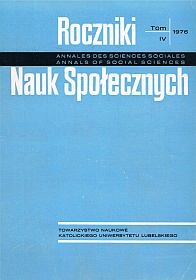Proces sekularyzacji rodziny jako instytucji społeczno-religijnej
Abstrakt
The structure, functions and processes of the family treated as a socio-religious institution depend upon the global society. Changes within lay or religious society always have some repercussions in the family. It seems reasonable to assume that social and cultural changes condition the interrelationship of the family and the global society, diminishing their range. Following the hypothesis, the interactions of the family and the traditional, industrial and postindustrial societies are discus- sed.
It is proved that the family plays the dominant part in the religious socialization, known as the „first socialization”, i.e. the one preceding the interference of the community. Therefore it is able to influence the religious formation of the child and help the Church to disseminate and interiorize religious values. Yet the situation of the family in the preindustrial society differs from its contemporary posistion in the industrial and postindustrial society.
According to sociological studies, in the past vast majority of families used to perform broadly understood religious function following the teaching of the Church. One may say that the family constituted the „starting point” of social and public life, being, the fundamental concentric community. The same cultural values were valid for both the family and the global society.
Nowadays, changes within the global society decreased the range of families performing religious function although the potential of its accomplishment has pends on both adaptation of the Church to the of contemporary man and proper remained the same. On the other hand successful realization of the potential de- attitude of the parents. Due to the growing autonomy of the family some parents contributing to the socialization of the chill perform the religious function to a limited extent. It is revealed in the selection of the bequeathed ideas. The Church losing its former control of the family becomes more dependent upon the parents and their decisions. It should be added though that nowadays because of transition from the public to the private realm the family constitutes a „hideout” where one can escape frustrations of the public life. It gives religion the chance of ascertaining itself in the private life, which is stronger than ever before. The degree of return to the realm of private life is determined by the development of the global society.
The analysis aims at revealing certain pattern of changes within the family as seen against the background of the secularization process, in particular at presenting the resulting problems and forming the hypotheses. If possible the author attempted to cite the results of sociological studies, dealing with Poland among other countries. The presented problems demand further investigation.
Copyright (c) 1976 Roczniki Nauk Społecznych

Utwór dostępny jest na licencji Creative Commons Uznanie autorstwa – Użycie niekomercyjne – Bez utworów zależnych 4.0 Międzynarodowe.


